The latest in a series of interviews with artists who have a significant body of work that makes use of or responds to network culture and digital technologies.
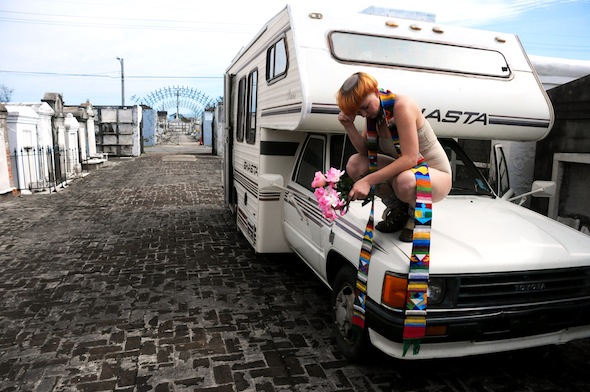
Genevieve Belleveau on the hood of the mobile monastery, St. Vincent DePaul Cemetery, New Orleans, 2014. Photo: Miss Megan Trosclair.
I've always found your practice really interesting and sort of futuristic in how it seems to concern itself with the faith science of "connection" as and where we find it. With your internet broadcasted reality show-performance-rituals, it was like you were tying together the rituals of spirituality with the exalted new [visual] language of technology. In this way I always felt like you were kind of an ecstatic, but now it looks like you're becoming an ascetic…?
My foray into asceticism was sparked by peak ecstatic experiences: I’ve always tended to vacillate between extremes of solitude and sociability in my life/art, and one inevitably informs the other. I've now re-emerged from that deeply ascetic period during which I lived in my Mobile Monastery RV under a bridge in New Orleans. At that time I was curious about a personal ecstasy that I felt existed beyond the compulsive internet use and rave/club kid culture I had become entrenched in back in NYC. I was reading Thomas Merton and wanted to know more about his ideas of solitude and silence, so I logged off Facebook and Instagram and took a pause to reflect on how that felt for me. I was primarily alone for two months, sitting still in a cold, powerless RV all day, but I let myself use Twitter as a platform to share through language alone. I've always been a comfortably hermetic person by nature, only recently learning how to function in a social sphere in a way that feels truly authentic to me. This period of silence was really important as I was able to remember and reflect upon deeply personal experiences that I had never given myself the space and time to carefully examine. It was a bit like a crowd funded arts residency or sabbatical: an interesting alternative model for artists seeking to clear a sacred space for creation.
Recently I've begun to recognize the interstice of the work of the monk and the work of a shaman. Both are ultimately laboring for the good of mankind through different means; the monk disavows the body through disciplined control and the denial of physical needs, while the shaman supersedes the body through use of ritual, psychedelics and trance. The monk desires to meet face to face with his vision of god through a path of internal examination, while the shaman seeks union with the "divine-all" through his connection to the earth, symbols, and others. I think about how these methods relate to social media and the discipline we exhibit online as way of mediating our brand, avatar and digital persona. Ultimately we are all online to connect—either with ourselves or with the other. We stay up all night on Wikipedia or whatever, trying to better understand our personal path in this life. Or we scroll endlessly on social platforms in hopes of discovering another human being vibrating at our wavelength. You can spend all night looking at pictures of yourself in the hope of representing yourself to the god figure that is the Other, the eye of the internet and the audience whose attention we are constantly seeking to capture. We might experience this space ecstatically, as an unadulterated catharsis where expression is limitless and we can TMI to our hearts content, knowing there is safety in the constant rush of content as it sweeps each new share away.
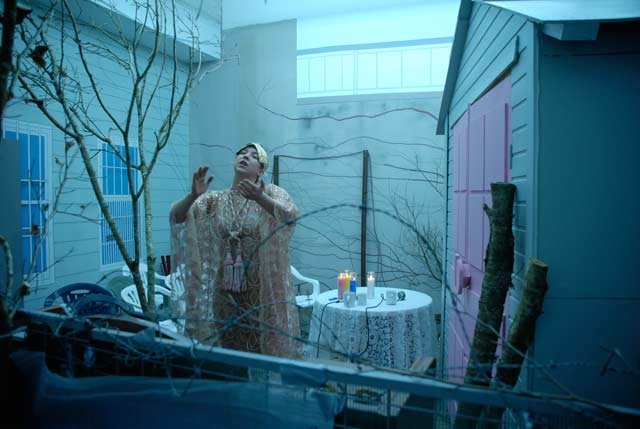
Genevieve Belleveau, from the series The Church of gorgeousTaps and the Reality Show. Performance/installation view at Lillith Performance Studio, Malmö, Sweden, 2010. Photo: Lillith Performance Studio.
I'm interested in the space of "the cloud" being a kind of analog for the divine-all that you mention. But how does the shamanic principle (riding the surf and divining affect through interference) intersect with the basic neoliberal prerogative for "self-branding" you talk about?
This is where my criticality and authentic belief system come into blissfully discordant discourse. I often reference new age-isms and spiritual dogma in a paradoxically parodic manner. There are any number of accessory objects, fetishistic placeholders, image indicators and the like that keep us on-track and corralled into the connective ties that bind (Click Cliques, #kloutgangs, etc). All of that is the "play" part for me, branding and rebranding as lighthearted activity that necessarily shifts our perspective as we undergo inevitable spiritual transformations. Branding is like "this little light of mine"; you let it shine with a blind faith that it is ephemeral, made of energy, not static, and will eventually burn out. Letting it "shine" precipitates crossbreeding with other brands/beacons/faith principles and people, creating fresh new memetic mutations.
When I play with religious tropes there is always a part of me attempting to buck the system of dogmatic regimes while concurrently honoring the historical brevity of these elaborate schematic devices. This is an important tension I try to maintain in my practice. I've found it to be the easiest way to indicate to an audience that the mythology I am engineering does indeed have a loftier goal than simply accruing attention currency (i.e. a boost); I can admit my own messianic tendencies, but also laugh them off—because overindulgent self-awareness is endemic to art-in-general. As long as you can call yourself out on the construction of a character you are also free to prosper in the role you've chosen. Krishnamurti said "To be religious is to be sensitive to reality." To me that sensitivity covers a full spectrum and includes the aptitude for evil, as well as the insatiable capacity for passionate lightness. In short, being brand-aware (though not necessarily on-brand) is the only intelligent way I know of navigating the complex fractals of the current ether-sphere. I believe eternal ecstasy is attainable through the evolving religion of the singular experience. I also believe it requires 360 degree vision that accounts for the both the banal and sublime in its focal scope.
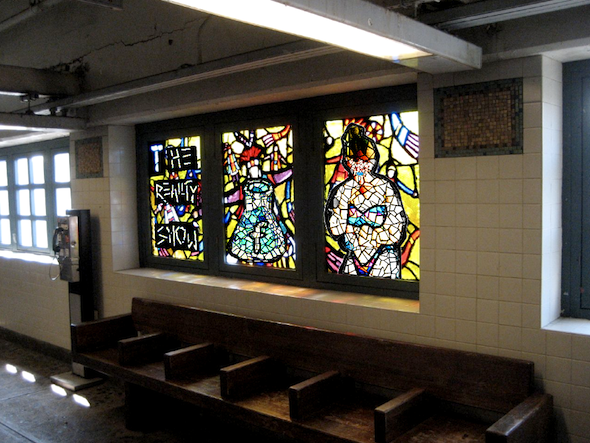
Promotional image from The Reality Show with gorgeousTaps (2011). Courtesy the artist.
I also love that you always foreground the body and talk about labor—both affective, immaterial, "free" labor (ie social media) and paid affective/manual labor. It seems really political when so much of postinternet obscures or disappears the idea of labor, even in the sense that automated softwares obscure the gesture. Feels like you've often tried to recuperate that labor in your work—Vining on the clock at Big Gay Ice Cream, turning your sex life into performance, LARPing your log-off at the Sandbox; it's like a consistent theme. Feels like you're basically working out aspects of Marx's theory of alienation or whatever.
My practice is foundationally socio-political in the sense that the self cannot be extracted from the complex politics of the society it operates within. I live in a capitalistic society so my required labor (and implied subversion of that labor) inherently impact—and essentially define—my experience of self. My most succinct artists statement to date is my twitter/insta bio—"Life is a LARP" (Live Action Role Play). With this I insinuate that all aspects of my daily life are available for my own use in artistic discourse, and also up for affirmative auction in the attention economy of the social internet. I consider my day jobs (at Big Gay Ice Cream and an 11-year stint as a nude art model) to be as important to my practice as anything that ends up in a gallery. These day jobs are also the primary means by which I embody a more traditional enactment of performance art by encountering the flesh and its limitations. Both jobs involve affective/emotional labor as well as intense physical endurance. Interestingly, a lot of people consider me a performance artist and ask me to "perform" all the time, when in actuality I mostly just perform IRL on the clock at my day jobs. It connects me to that part of the human experience that may become more archaic as we move towards screen-based and augmented performance practices. As with my recent explorations in asceticism, I value using the body as a studio, in which the rudimentary knowledge in organic material informs the emerging knowledge we’re trying to navigate through new technology. I like having these sort of grimy, gritty, grotesque foundations in my life to help cultivate acceptance of our accelerating techno-evolution. I see it as my slow elegy to the decay of the body and the foreboding sense we share that these vessels will soon be retired due to the superior data processing capabilities of the ether-sphere.
In terms of recuperating my labor, I've always been committed to using my daily life as material, since I was a teenager, really. For example, working as an ice cream truck driver for 6 years has taught me so much about the fragile psyche of the infant and its bond to the mother. Never has this been better illustrated than in an instance of watching a grown-ass man in a business suit throw a temper tantrum at my truck window one day when we were out of chocolate. In that particular LARP, I play the role of matriarchal dairy delivery who releases her product to the desiring, reward-starved child or else refuses to deliver. Some day I will write a dissertation on the "Sociology of Soft Serve and the Discipline of Mistress Softee," but until than it’s all just part of my living an enriching, interstitial existence that makes me giggle when I step back and look at it all. I perceive my higher purpose to be a healer, so I tend to submit myself to avenues in which I am of-service in some way. Either as a mothering nurturer figure or as muse to a new generation of artists, so long as the labor I am enacting stays aligned with my higher call, I am content to pursue that in tandem with traditional artistic platforms.
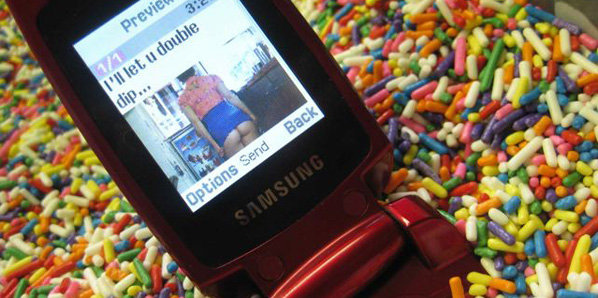
Genevieve Belleveau, Sex Cells: Exhibition Winner, 2009. Photograph of sext sent from ice cream truck. Courtesy the artist.
You often channel archetypes of the sacred feminine, like the holy whore or the vestal virgin or high priestess or whatever, but I feel like you queer that stuff a bit with the whole tonsured monk thing and through being a girl mechanic van driver.
I do identify as queer, particularly in the antiquated sense of the word i.e. existing outside the bounds of normal society. I think of myself as an outsider artist who happens to have an art degree. I can sort of LARP the art-world thing based on my education, but I can’t help but be pulled back to the fringes because that is where my true passion lies. I am absolutely channelling sacred archetypes and raising goddess consciousness along with some of my contemporaries, Labanna Babalon and Chez Deep and Fannie Sosa. I tend to temper my work in that arena with a fair amount of animus (masculine aspect) as a personal exercise in incorporating the shadow and moving towards individuation.


Top: Genevieve Belleveau, New Ascetic, photographed by Angelina Dreem, 2013. Bottom: Genevieve Belleveau, Stagnant Refreshing (2013). Photographed by Angelina Dreem. Both images courtesy the artist.
You've explicitly addressed the selfie culture as a device for self-healing or self-affirmation; what are your thoughts on the female body and the gaze in the age of total [self] surveillance?
My work in #selfieaffirmation, prior to pursuing my ascetic practice, relied very heavily on the presence of a feminine anima; a socially acceptable form of my female body that would garner the attention I desired at that time. There is an innate power in embodying this role; you can hook the worshippers’ attention, but when you have it you had BETTER have something important to say! That's the true goddess, not just passive icon, but powerful promoter of a more peaceful paradigm. She has to know with an intuitive wisdom what is needed to create the conditions for love on this planet at this time. I see the selfie as a useful tool for women just beginning to come into their personal power. It is an affirmative process that helps you examine your response to attention (or lack of attention) and can guide a cultivation of your feminine prowess. Males can use this tool as well, though I have less knowledge of the masculine experience of the selfie. It seems there might be more shame surrounding it, something that will be important to disassemble as we continue to move towards selfie-acceptance.
One of my main missions is to de-stigmatize the internet as a narcissistic guilt trip. We all long for affection, and social media can be a wonderful way of meeting people you would not have found in any other way. If someone takes a selfie and you see something in their eyes that you can relate to, it is pure magic; we are examining ourselves refracted through a couple thousand followers, creating an ever more prismatic version of identity. It’s possible that this could dispel a notion of rigid self-identity and begin to vaporize the ego into a collective expression and ethical experience of reality. We are already developing psychic abilities and ways of diminishing the lines that separate you from me. Last night at 5am I was lying in bed and you (Jesse) liked the picture of my cat I had posted to Instagram. There is a lot of information that remains unshared in the process but we were also brought together in the moment and I love that. I live for that ecstatic bliss of being that we can achieve if we open our hearts to really loving ourselves and sharing that self-love with one another. I don't think that selfies solve the problem, but I think they can be a step towards self-acceptance that can be further explored as we inevitably thrust onwards in this vision of the future.
Top: Vine by gorgeousTaps, Feb 20, 2013. Middle: Vine by gorgeousTaps, Feb 18, 2013. Bottom: Vine by gorgeousTaps with Labanna Babalon, Jul 28, 2013. For audio, mouse over top left corner of video and click on speaker icon.
On a related note, what do you think about all the stuff about privacy or privatization of the self on social networks? There's been a lot of paranoia and righteous anger about the way quantitative data is used by conglomerate web platforms but I feel like you might have a more nuanced view of all that.
I tend to be critical of anti-social media click bait. We are all users in the network that we are criticizing and it's clear that these networks have been developed to sate a basic human desire for community.
My next project will address some of this through a BDSM-based, psychosexual role play therapy I'm currently developing. This project is in its tender genesis stage, but I imagine it will touch upon Marx's ideas of labor and alienation in a perhaps unexpected light. It will also tie in recurring themes of obedience and discipline, reward and punishment -and the ultimate desire to be seen and affirmed. The power dynamic of the slave/master relationship clearly runs very deep in Western culture, and I'm curious about the sense of oppression people feel when online, particularly this popular grievance that we are somehow shackled to our use of social networks. We must remember that nobody is forced to use any of these networks. If we feel enslaved, we have chosen this role for ourselves. Despite the fact that most of us don't read the Terms of Service Agreement, I feel we all implicitly agree to a privacy tax for the sake of access to a diverse network. In fact, I'm not entirely convinced that we want to be as private as we claim. We are complicit in agreeing to losing some of our rights at the risk of depersonalization and even humiliation. Perhaps there is a sense of relief in releasing control. We "hate it," but we also acquiesce, because the rewards of consistently accessible companionship outweigh the punishment of destabilized identity authorship. It goes back to the irrepressible desire to connect and the sacrifices one will make in order to attain that sense of connection. In my guru role I preach "let go and let gorgeous." If we relax our rigid constructs of personal identity, we can begin to get to the really good stuff, the connective fibers of community and shared experience. We can abolish binaries and outdated social codes and get down and dirty—and do so on the daily. With this fluidity comes true freedom and the friendship we all truly long for, as we click our way to catharsis.
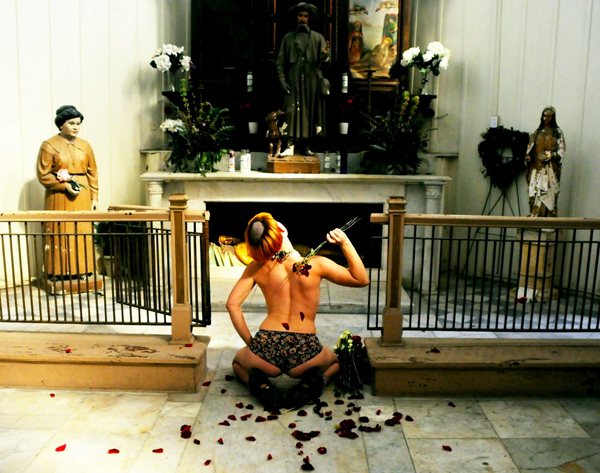
Floral Flagellation, St Roch's Cemetery, New Orleans, 2014. Photo: Miss Megan Trosclair.
Questionnaire
Age: 30
Location: Los Angeles / RV Based Artist
How/when did you begin working creatively with technology? Directing videos on a VHS camcorder in 1994. Got really into "The Palace" chatroom in 1996. Using Facebook as an online performance platform since 2005.
Where did you go to school? What did you study? Bennington College; graduated in 2007. I studied experimental theatre, voice and interdisciplinary art. You name your own "focus" there, and I called mine "Intensely Pretending."
What do you do for a living or what occupations have you held previously? I work for Big Gay Ice Cream as an assistant to the owners and ice cream truck manager. I nude model for artists in photo, painting and drawing. I have worked as an assistant to video artist Laura Parnes since 2006.
What does your desktop or workspace look like? (Pics or scrnshots please!) I use the Big Gay Ice Cream construction site/office as my computer workspace and place to sing karaoke alone, everyday. I also have a painting studio temporarily set up in their basement in downtown LA where I am working on my first book which will be writing and illustration in the style of an illuminated manuscript. I live in my 1988 Shasta RV Motorhome which was crowdsourced to be a live/work space for my Mobile Monastery project. I mostly just sleep and write there now, but eventually I’d like to use it to host an Intentional Internet residency space for those seeking social media sanctuary.

